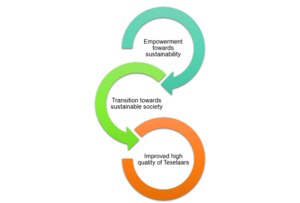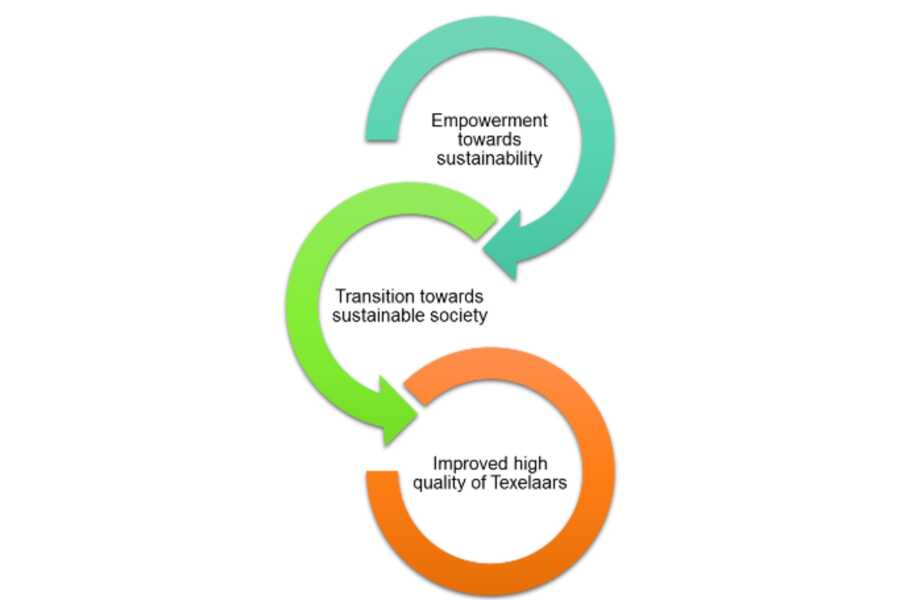The overall outcome of the Health, Happiness and Well-being subsystem is to ensure an improvement of the life quality of Texelaars reflected in more happy and healthy lifestyles among inhabitants. In order to achieve this goal, the need to joint efforts with the other sub-systems in the Texel system was recognized in order to ensure all initiatives’ alignment towards a positive influence in the living of texelaars. Furthermore, is necessary to define what the required contribution of this subsystem is in order to achieve the overarching goal. As this specific sub-system is the only one directly addressing people, their lifestyle and their perception of life, it was concluded that its main contribution has to be related to the society transition towards more sustainable values.
The need for the transition towards a sustainable society is closely related to the concept of sustainable happiness, defined as the pursuit of happiness that does not exploit other people, the environment, or future generations. In terms of values, two definitions can be found: intrinsic goals, such as personal growth, self-acceptance, relationships, physical fitness, and community involvement; and extrinsic goals, such as financial success, social recognition, image and popularity. Generally speaking, intrinsic value orientation is associated with higher levels of subjective well-being, less materialistic or consume-oriented behavior, healthier habits, and more engagement with environmentally friendly behaviors than extrinsic value orientation (O'Brien, 2008).
To further reflection, O’Brien (2008) addressed some questions that are relevant in the context of Texel: “Is it possible to assist individuals to make better choices about happiness, for themselves and all life on the planet?; Is it possible to create communities, towns, and cities that make people happier sustainably and thus contribute to public and environmental health and well-being?” (p. 291). From this point of view, the main challenge for the transition of texel towards a sustainable society is related to the empowerment of texelaars towards sustainability and their pursue of sustainable happiness. Consequently, the final goal of this sub-system is related to create an empowerment platform in order to promote among texelaars intrinsic values that support and facilitate the transition (Figure 1).

Figure 1: Mechanism to achieve Health, Happiness and Well-being sub-system's goal
In order to define the requirements to design such an empowerment platform, firstly it is necessary to analyze the current state of the subsystem and the actors that are involved in making the transition society. For analysis purposes, current Texel’s society is divided in three main groups that have similar interests, willingness and attitude toward sustainability. These groups were chosen because each group will have a different position in the future sub system regarding sustainability and will have a different influence on the values of the other groups.
- Entrepreneurs: People starting new business and trying to diversify Texel’s economic development sources taking advantage of the island’s resources and capabilities. They are key actors in the transitions towards sustainability in the island as they are used to take risks.
- Young people: Can be defined as the people aged from 10 -19, going to school and building their perception of life, behaviors, the future possibilities for Texel and its relation with sustainability.
- Average inhabitants: Regular texelaars that are active part of the island but have already defined their values, behaviors, perspectives of future possibilities for Texel and its relation with sustainability.
Secondly, it would be necessary to define which values are going to be related to the transition in the sub-system. The success of the future subsystem relies on the values of the people of Texel being sustainable ones. Therefore, the current values need to be analyzed to determine what needs to be done in order to bring about a change in these values. For the analysis, the values that affect life quality are going to be divided into several categories:
- Family: To spend quality time with family
- Financial Resources: To secure the resources to support short-term and long-term financial goals.
- Friends: To build, strengthen and preserve personal friendships
- Health and fitness: To be healthy and physically fit
- Home and place: To make my home in a location and community that supports my desired lifestyle and personal values
- Leadership: To play an important role in the leadership of a group, a company, or an organization.
- Leisure Pursuits: To pursue hobbies, sports and interests outside of work and family.
- Personal Growth: To constantly learn new thing to expand horizons
- Public Service: To make a contribution to the community or society as a whole.
- Spirituality: To explore and develop the spiritual side of my life
- Work satisfaction: To do work that is enjoyable and stimulating.
Each category represents different values. As values may differ between people according to their interests, the analysis of values will be done for each of the groups already defined. For the assessment of the current and future values of the people of Texel, we will firstly make an assumption, based on research. When at Texel, we would like to present the list of values to the Texelaars to determine whether our assumptions where correct and, then, make the proper adjustments.
Value analysis
Future Values and comparison of values for the entrepreneurs of Texel
Future Values and comparison of values for the young people of Texel
Future Values and comparison of values for the average inhabitant of Texel
Trends and technology
The entrepreneurs are the main group trying to make moves towards improving the levels of health, happiness and well-being in Texel. In terms of what is happening already, even if not entirely successful yet in terms of scope, it can be seen that Texel society has started to move towards more intrinsic values and it is trying to overcome current practices or behaviors challenging their vision of a sustainable society. Some initiatives can be found as a first attempt to make the needed changes in the Texel society, they may need more coordination between all groups and common agreements on what is needed initially to empower people towards the sustainable happiness. However, this initiatives are valuable learning experiences to base the draft of the proposals for the transition of the sub-system.
Current initiatives related to health, happiness and well-being can be divided in the following categories:
- Community education: Texels Ondernemers Platform is concerned about guarantying education to children from 6 to 18 years on the island in order to become more raise highly qualified personnel with bounding with the island, and to open educational opportunities to retain them. Furthermore, they consider vital to sustain the educational infrastructure and are willing to support initiatives targeting such goal. Moreover, in the summer of 2013 they launched Operatie Onderwijs Texel, opening opportunities for all to teach on Texel. Finally, they have had meetings with students to share with them information about jobs available in Texel and the development required to access to them.
- Healthy food: Texel is full of farmers with sustainable processes for production, however not always their products are labelled as sustainable or their organic properties are promoted. Understanding local production gives the feeling of social activity participation to children, which can result in closer relationships between family members and with the island and the environment. With initiatives such as De zelfpluktuin, a free entry garden where groups of family tourist can enjoy and let their children picking up chemical-free fruit, vegetable and flower from the garden, this trend can become a touristic attraction for Texel and can be capitalized to promote healthy habits among inhabitants.
- Nature capitalization: There are several projects that has been executed or are under execution to promote tourism and recreation taking advantage of the natural resources of the island, such like Planet Texel, DNA-kustplaatsen and Mooi Texel. Texel is looking at tourism beyond the needs of increasing capacity and it recognizes the need to safeguard the core values for the future. Thus, the preservation of natural reservations is a priority that have mobilize entrepreneurs to even execute auctions to collect the funds needed to make it happen. The value of nature goes beyond tourism to the life quality of inhabitants and how these spaces can be capitalized to promote sustainability in the island, this fact open questions regarding measures that should be taken into consideration when designing the proposals.
- Entrepreneur’s empowerment: There are two main entrepreneurs’ networks at Texel: TOP (Texels Ondernemers Platform) and JONT (Jonge Ondernemers Netwerk Texel). Both make use of web platforms to connect its members and share relevant information about projects, news, knowledge and experiences. Moreover, they have some meetings over the year in physical spaces in Texel to strengthen networking and experiences’ sharing. While JONT is more focus on giving support to Texel’s young entrepreneurs, TOP does not have age limit and focuses on the interests of all businesses in Texel and connect individual activities to increase impact and collective benefits. These initiatives are actively giving support to the first movers on making things happen and make use of technology to create networks, these skills can be further develop to promote the sustainable transition.
The current trends and technology are a good basement for the initiatives that are being designed for the system. As the current sub-system already is targeting towards a sustainable transition the question now is strongly focus on the how. How to succeed in promoting sustainable values? We thing that the best way is to make them experience, from the initial or seed proposals, what is meant by sustainable happiness. Furthermore, it is necessary to establish a sustainability promoter mechanism that can receive and promote the execution of further initiatives to be proposed by islanders.
Finally, when analyzing the interactions of the three selected sub-groups, it was remarked the need to seed in the young generations sustainable behaviors for them to further promote the switch towards more sustainable values in the long term. Consequently, the seed proposals are focused on promoting, especially among young Texelaars, sustainable happiness through connecting them with entrepreneurs that can empower them toward implementing new initiatives, and providing them with spaces to experience sustainable happiness in a fun way related to their interests. Once the young Texelaars start engaging in the transition, it is expected that they can start influencing the average inhabitants’ behaviors.
References
O'Brien, C. (2008). Sustainable happiness: How happiness studies can contribute to a more sustainable future. Canadian Psychology/Psychologie canadienne, 49(4), 289.
(n.d.). Retrieved on november 16th, 2014, from De Zelfpluktuin: http://www.zelfpluktuin.nl/
TOP (2013). Community education. Retrived on december 4th, 2014, from: http://www.top-texel.nl/actueel/onderwijs
TOP (2013). Community tourism & recreation. Retrived on december 4th, 2014, from: http://www.top-texel.nl/actueel/community-toerisme-en-recreatie
TOP (2014). Texels Ondernemers Platform. Retrived on december 4th, 2014, from: http://www.top-texel.nl/
JONT (2014). Jonge Ondernemers Netwerk Texel. Retrieved on december 4th, 2014, from: http://www.jont.nl/
Business and Biodiversity campaign (2012). Recreation Entrepreneurs on the Dutch Isle of Texel Have Chosen for Nature. Retrieved on december 4th, 2014, from: http://www.business-biodiversity.eu/default.asp?Menue=8&News=1240


